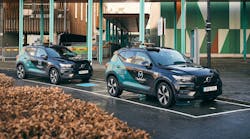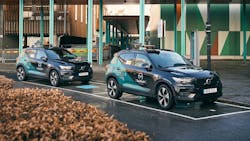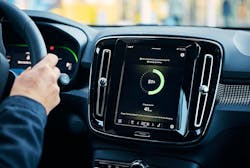Wireless charging of electric vehicles (EVs) has been the subject of much speculation over the last five or so years. A few test runs emerged, but mostly rumors about carmakers taking the plunge didn't come to pass. However, that smoke is now finally accompanied by fire: Volvo Cars is integrating and testing a new wireless-charging technology in a live city environment together with selected partners, evaluating its potential for future electric cars.
Charging pads from Momentum Dynamics—whose wireless tech was used in an Oslo taxi charging pilot project a few years ago—were installed in two taxi stands in Gothenburg, Sweden. While Momentum’s technology has been in full commercial use for more than four years on various types of electric vehicles, this program, part of the Gothenburg Green City Zone, will allow a small fleet of fully electric Volvo XC40 Recharge cars to be used as taxis.
Over a three-year period, the small fleet of fully electric taxis will be in service for Cabonline, the largest taxi operator in the Nordic region. Its fully operational taxi environment will include charging wirelessly at taxi stations in Gothenburg, Sweden.
Inductive Charging
The inductive-charging technology to be used is based on the scientific principle of resonant magnetic induction. It promises to provide fast, automated charging for electric vehicles with no moving parts.
“Automated charging provides unlimited driving range for high-intensity driving and our system enables Gothenburg cab drivers to stay in revenue service all day,” said Momentum Dynamics CEO Andy Daga. “We are pleased that the system was integrated by Momentum and Volvo Cars engineers into the fully electric XC40 Recharge so efficiently, even with the difficulties of COVID-19.”
The charging starts automatically when a compatible vehicle parks over a charging pad embedded in the street, allowing drivers to conveniently charge without getting out of their car. To easily align the car with the charging pad, Volvo Cars will use its 360-degree onboard camera system. For the fully electric XC40 Recharge cars, the wireless charging power will be more than 40 kW. Thus, charging speeds are around 4X faster than a wired 11-kW ac charger and almost as fast as a wired 50-kW dc fast charger.
How Does It Work?
The vehicle side of the wireless-charging system comprises a receiver pad and an electronics module. High-frequency ac is converted to dc, which directly charges the vehicle’s battery. An alternating current is fed into a resonant transmitting coil that creates a magnetic field. The magnetic field is captured by a resonant receiving coil, creating an alternating current in that coil.
The ground side of the wireless-charging system consists of a charging pad installed in the pavement, which is connected to an electronics cabinet. High-frequency ac power is generated by the electronics cabinet and transmitted by the charging pad to the vehicle.
Testing It Out
The wireless-charging test is one of many projects outlined within the strategic initiative Gothenburg Green City Zone, under which designated areas within the city are used as live testbeds for the development of sustainable technologies.
“Gothenburg Green City Zone lets us try exciting new technologies in a real environment and evaluate them over time for a potential future broader introduction,” said Mats Moberg, head of Research and Development at Volvo Cars. “Testing new charging technologies together with selected partners is a good way to evaluate alternative charging options for our future cars.”
In total, the Volvo cars will be used for more than 12 hours a day and drive 100,000 km per year, which also makes this the first durability test of fully electric Volvo cars in a commercial usage scenario.
Other partners involved in the wireless-charging project include the company’s own Swedish retailers Volvo Bil and Volvo Car Sörred, Swedish energy company Vattenfall and its charging network InCharge, the city energy company Göteborg Energi, and Business Region Gothenburg, a municipal economic development agency owned by the City of Gothenburg.
Last year, Volvo Cars took part in launching the Gothenburg Green City Zone initiative. Using a real city as a testing ground will enable the company to accelerate development of technologies and services in the areas of electrification, shared mobility, autonomous driving, connectivity, and safety.
The project reflects Volvo’s ambition to become a fully electric car maker by 2030 and its commitment to an ongoing reduction of its carbon footprint, with the ambition to be a climate-neutral company.


